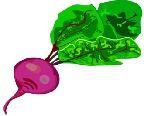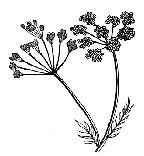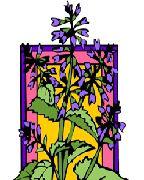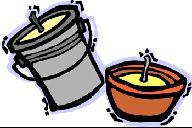Natural Solutions to Things That Bug You (90 page)
Read Natural Solutions to Things That Bug You Online
Authors: Myles Bader

Crush the plant leaves and stems in water and use 1 part of the crushed up plant material to 5 parts water. Allow the mixture to sit for 1 hour before straining and placing in a sprayer. This is a general insect killer. If you prefer the plant parts can be dried and ground into a powder to dust the plants.
ANISE
 This herb is best made into an infusion, which should remain for about 1 hour before adding a dash of hot sauce and ½ teaspoon of Dr. Bronner’s Peppermint Soap™. This solution works on most caterpillars and leaf-eating insects. It will, however, remove many beneficial insects as well. Start with anise oil from a health food store.
This herb is best made into an infusion, which should remain for about 1 hour before adding a dash of hot sauce and ½ teaspoon of Dr. Bronner’s Peppermint Soap™. This solution works on most caterpillars and leaf-eating insects. It will, however, remove many beneficial insects as well. Start with anise oil from a health food store.

AZALEA
Dry azalea flowers and crush them into a dust. This will kill many harmful insects by poisoning them, however, it is best not to use it on vegetable gardens.

BALM
Balm oil is the form to use. It will repel aphids, all ants and many other insects. Only use one capful to 1 quart of tap water. Balm should be available in most drug stores.
BASIL
 It is best to purchase it as sweet basil oil. It is more effective when added to pyrethrum or tobacco leaves. The basil extracts are very powerful and it doesn’t take much to eliminate mosquitoes, their larvae and even houseflies. Use only 1 ounce per gallon of water in a sprayer.
It is best to purchase it as sweet basil oil. It is more effective when added to pyrethrum or tobacco leaves. The basil extracts are very powerful and it doesn’t take much to eliminate mosquitoes, their larvae and even houseflies. Use only 1 ounce per gallon of water in a sprayer.
Basil has also been shown effective on a number of fungi. If you do use tobacco, remember it is a poison and keep it away from roses and fishes.

BEETS & JUICE
Flying insects hate beet juice especially if you add a small amount of Tabasco Sauce™ or other hot sauce to it. Effective as a spray, that will control a variety of plant diseases. Easy and inexpensive to make providing you have a juicer.
BLACK PEPPER
If you sprinkle a small amount of black pepper around squash vines it will repel squash vine borers.

BORAGE OIL
Prepare as an infusion to control most leaf-eating insects. Borage oil is very effective in repelling them as well.
CABBAGE LEAVES
These leaves are very attractive to aphids and are used to attract the bug into aphid traps. If you want to make an infusion for a spray, just allow some cabbage leaves to simmer in boiling water and add a dash of Tabasco Sauce™. Allow it to remain overnight before using it in the sprayer.

CHAMOMILE
Prepare as a tea and allow the tea to cool before spraying on plants. Commonly used by landscape supply houses, sprayed on flats and flowerpots. Also commonly used on cucumber seedlings to prevent mildew.
CHIVES
Use very fresh chives and prepare a tea that has steeped for about 15 minutes. Cool before using on plants and spray gooseberries and cucumbers to prevent mildew.
CAMPHOR
This is a whitish, crystalline substance that is produced from the gum of an Asian tree. The odor is very pungent and it will repel a number of insect pests. Moths, especially hate camphor. Dilution with alcohol is recommended if you plan on using it for a spray.
The natural sources for camphor include sage, tansy, feverfew and plants from the artemesia family.
COCONUT OIL
The oil can be diluted depending on the strength needed and will kill most soft-bodied insects. Coconut oil can kill beneficial insects, so you need to use sparingly. The leaves can also be used as well as the sap. Always make sure the label reads 100% pure coconut oil. It will work great against most hard-shelled insects.

CARAWAY
Caraway will work great on chewing insects when prepared as an infusion with a small amount of Ivory Liquid Soap™ added. You can also add a dash or two of Tabasco Sauce™ to give it a kick.
CASTOR OIL
Made from the castor bean it works better when added to pyrethrum or any other natural insecticide. Best to purchase the concentrated oil and use 1 ounce per gallon of water with pyrethrum added. It is not recommended for use on vegetables or fruit.

CATNIP
When a solution of catnip is sprayed on plants it will prevent insects from setting up housekeeping and it will even work on caterpillars and some worms. Best to make a tea that is not too strong so that you don’t damage the plant while killing the bugs. Don’t use if you have a cat or one visits your garden.
CAYENNE PEPPER
Tabasco Sauce™ is a good source of cayenne pepper; however, you can use the ground pepper with an equally good result. A weak tea can be prepared from the powder, which will kill most insect pests. Don’t make the tea too strong or it may kill all the insects that are sprayed. Make sure you purchase only cayenne or hot sauce that does not contain any preservatives.

CITRONELLA OIL
